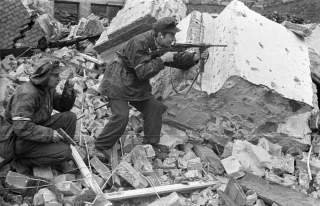Remembering the Warsaw Uprising: August 1, 1944
As the world looks back at World War I, another anniversary looms large.
Closer to our own time, the author and former dissident Adam Michnik, in an essay marking the 25th anniversary of the Solidarity movement, felt that while the Rising was heroic, it was also “a complete catastrophe. The flower of Polish youth perished, thousands of civilians killed, the capital of Poland was completely ruined, and the political benefits equaled zero.”
Yet as time passes, the Rising’s place in the Polish popular imagination—at least according to a 2013 poll, where it ranked as the most important insurrection in the country’s history—may perhaps be beginning to align more closely with the judgment of a Yale historian who has described it as, “An ecstatic, desperate sacrifice. A sacred martyrdom.”
Regardless, the 70th anniversary of the Rising ought to be remembered on these shores, because it is an episode that brings to the fore all the ambiguity missing from America’s selective memory of the Second World War. The fate of Warsaw—and that of Poland for the next forty-five years—stands in eloquent rebuke to what the scholar Andrew Bacevich has trenchantly called “The Washington-Hollywood Axis of Illusions” through which war’s more dubious means and ambiguous ends are consistently airbrushed out of the picture. A more sober assessment of “The Good War” may help to shake the American faith in the panacea of military action; and a reconsideration of American and British wartime failures—such as the failure to provide any meaningful assistance to their Polish ally during its heroic sixty-three-day struggle—might be a good place to start.
James W. Carden is a contributing editor of The American Conservative.

